Chinese New Year has come around again and 2023 is the Year of the Rabbit!
Those adorable little cotton tails are the fourth of the 12 zodiac animals in Chinese mythology, symbolising longevity, peace and prosperity. If you were born in 1927 (yes, a few are still alive!), 1939, 1951, 1963, 1975, 1987, 1999 or 2011, then you’re a Rabbit and you’re thought to be ‘vigilant, witty, quick-minded, and ingenious’. Lucky you!
What is Chinese New Year? How is it different from the Western New Year?
Chinese New Year, or Spring Festival, is based on the Lunisolar (a combined lunar and solar calendar that follows the movement of the sun and moon) that was introduced to Chinese culture turning the Zhou Dynasty around the 8th Century BC - that's almost 2,800 years ago! The start of the New Year changes from year to year and is marked by the second full moon following the December solstice, which means it usually falls between 21st January and 20th February, and lasts until the following full moon. This year it started on 22nd January 2023.
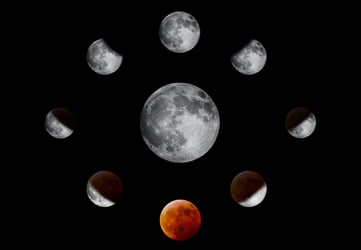
Alexander Andrews via Unsplash
Why is it called Spring Festival when it takes place in winter in China? Good question! According to chinahighlights.com the Spring Festival takes place 'during the time that the northern hemisphere starts its gradual warming, having already passed the coldest part of the winter'. Keep in mind that the Northern Hemisphere experiences its seasons opposite to us.
In Western culture, we have a fixed date for the New Year (1st January) because we follow the Gregorian calendar and usually only celebrate for a day.
Fun Fact: 96% of all Chinese New Year's celebrations will start in February.
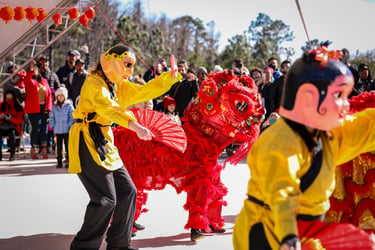
What is the Chinese Zodiac?
China's traditional zodiac features 12 animals, each with its own attributes, just like the celestial zodiac that much of the world is more familiar with. The 12 animals are the Rat, Ox, Tiger, Rabbit, Dragon, Snake, Horse, Goat, Monkey, Rooster, Dog, and Pig.
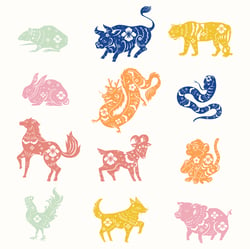
If you've ever been to a Chinese restaurant and seen the placemats with all the animals, you'll know that the animals are allocated to years, not months, and they occur in a 12-year instead of a 12-month cycle like the celestial zodiac.
Mythology
As with most ancient cultures, many of the traditions are steeped in folklore, and this is no different. The legend says that in ancient times the mythical beast Nian, usually depicted as a lion, ox or unicorn, would appear during the Spring Festival every year, terrorise the villagers and eat people during the night (delightful, right?!).
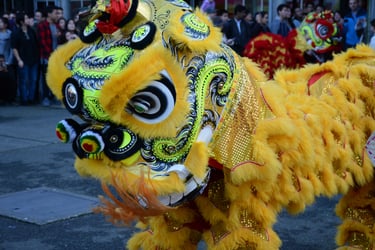
One year all the villagers hid from the Nian but a deity appeared, put up red papers and set off crackers to scare the beast away. The villagers learned that the beast feared the colour red and loud noises, so every year thereafter they would dress in red, hang red decorations, play drums, and set off fireworks. The Nian never returned and the traditions have remained a strong part of their culture.
As the Nian is associated with the Spring Festival, the name also translates to 'New Year' (年).
What other traditions are followed during Chinese New Year?
Red EVERTHING!
Clothing, decorations, gift wrap... if it's red, it's in! Red symbolises prosperity, joy, virtue, truth and sincerity.
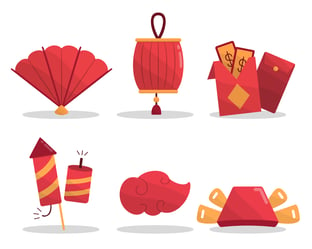
Filial Piety
Reverence for your elders and ancestors is an extremely important concept in China, and has been since ancient times. On New Year's Eve family members will often visit the graves of their ancestors to offer 'sacrifices' before the Reunion Dinner. These sacrifices are usually food and drink items, 'letting their ancestors "eat" first'.
Reunion Dinner
People travel from all over China to gather with their family on New Years Eve. Over 200 million people travel during this time and take approximately 3.5 billion journeys within China itself. This annual 'migration' has earned the moniker 'Chunyun' (春运), 'Spring Movement' or 'Spring Festival Travel Rush'.
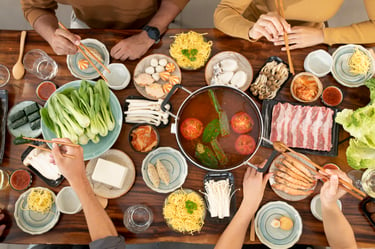
Red Envelopes
Also called Ya Sui Qian (压岁钱), red envelopes are given to children and immediate family filled with money for good luck, and always in even numbers (odd numbers are unlucky, like gifting a wallet without a coin in it).
There is folklore around this tradition about a child being protected from demons by having money in red wrapping hidden under their pillow, and a child being rewarded with money in a red envelope for saving a village from a demon attack.
This has become a bit more hi-tech in recent years with the implementation of digital money transfers.
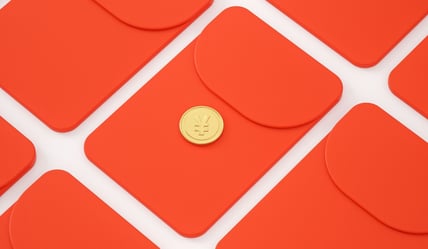
Exchanging Gifts
Usually consisting of cakes, sweets and fruits wrapped in red or gold paper to symbolise good luck.
Any taboo's to avoid?
Absolutely! With any age-old tradition, there are things that shouldn't be done.
On New Years Day
- Eat porridge and/or meat for breakfast as it represents poverty.
- Sweep or take out the garbage on New Year's Day as it symbolises sweeping away wealth and throwing away good luck.
- Use negative words as New Year's is a time for positivity, so if you need to discuss something negative, use a euphemism instead.
- Cut your hair. Hair, or 'fa' (发), has the same pronunciation as it does in the word 'facai' (发财), which means 'to become wealthy'. The implication means that cutting your hair may bring misfortune.
Fun Fact: most people have probably seen ancient Chinese artwork where everyone has long hair or their hair up in a top knot. This is because it was traditionally believed that your hair was a gift from your parents/ancestors and to cut it was considered disrespectful.
During Spring Festival
- Use knives or scissors because the danger of sharp objects is believed to be indicative of quarrels and the depletion of wealth.
- Give gifts with negative meanings or associations. Anything associated with funeral customs (hankies, towels, chrysanthemums, black and white items), clocks or watches (symbolise time running out), knives or scissors (symbolise cutting ties), shoes (symbolise walking or running away from a relationship), or mirrors are a big no-no.
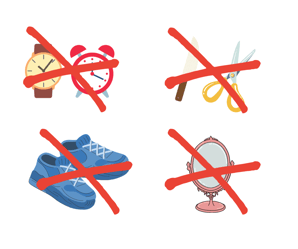
- Breaking items such as plates, bowls, vases, glass or mirrors as it symbolises incompleteness and bad fortune.
- Give monetary gifts in odd amounts as good things always come in pairs, and avoid unlucky numbers such as 4 and 40.
So, that's Chinese New Year in a nutshell! Now you'll be able to watch the local celebrations during the Spring Festival and understand what it's all about.
Will you be celebrating Chinese New Year?